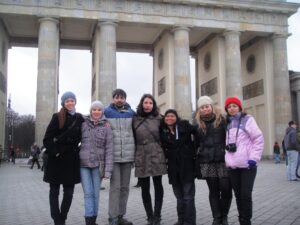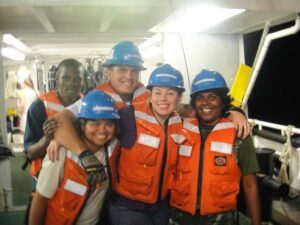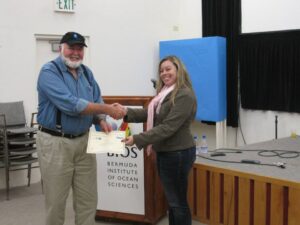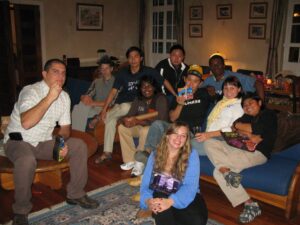POGO Alumnus:
(1) Austral Summer Institute 2007; (2) NF-POGO Centre of Excellence 2009-2010; (3) POGO SCOR fellow 2014
“The 2007 POGO-supported Austral Summer Institute (ASI) training course was my first international experience and my first contact with ocean colour remote sensing. I wanted so much to attend this training that I did not mind travelling 60+ hours by bus from São Paulo (Brazil) to Concepcion (Chile). Not only totally worth it but I got myself a funny story I still share these days.”
by Lilian Krug
Alumni (Austral Summer Institute 2007, NF-POGO Centre of Excellence 2009-2010, POGO SCOR fellow 2014)
Instructor (NF-POGO Centre of Excellence 2015-present, NF-POGO Floating Summer School – South North Atlantic Transect 2019)
POGO Scientific Coordinator
The 2007 POGO-supported Austral Summer Institute (ASI) training course was my first international experience and my first contact with ocean colour remote sensing. I wanted so much to do attend this training that I did not mind travelling 60+ hours by bus from São Paulo (Brazil) to Concepcion (Chile). Not only totally worth it but I got myself a funny story I still share these days.
The course was very well organised and conducted, I have received great support from the organisation in all matters from the application to the farewell. Moreover, I have made contacts and friends that I still get in touch with after 13 years. This training meant so much more than learning how to operate an instrument, programme a software or process a satellite image. All these were most certainly fundamental in my studies as a satellite oceanographer but attending this 2-week international training was extremely transformative on a personal level.
For instance, this training has showed me how thoughtfulness and camaraderie go a long way and do not mind language proficiency. Of course, learning from the instructor, the renowned Dr Ajit Subramanian, on its own was invaluable but learning from and sharing with my training fellows was remarkable. I had no experience with Linux and it was thanks to the kindness of my Peruvian colleague (now friend) Juan that I could follow the first exercises. At the same time, I helped my Argentinean colleague to understand oceanographic concepts which she, as an Engineer, was not familiarized. All of these in a hard mixture of English, Portuguese and Spanish.
The ASI also opened my eyes to enhance my knowledge outside graduate courses’ disciplines or studying from books and publications. POGO showed me there were organisations that could make this come true to students as myself. I was determined to find new opportunities. Two years later I was selected as one of the scholars for the 2009-2010 NF-POGO Centre of Excellence (CofE) in Observational Oceanography at the Bermuda Institute of Ocean Sciences. Eleven modules, ten months, five scientific cruises (to the infamous BATS), one independent research project. The experience was even more intense, the thoughtfulness and camaraderie even stronger. My nine colleagues from around the world became friends and family.
It was during the CofE that I met three mentors that are special to my heart and fundamental to what I am today. Dr Murray Brown, Prof Trevor Platt and Dr Shubha Sathyendranath. Dr Brown was our instructor for Ocean Data Management (ODM) and encouraged me to become an instructor myself. Today I am one of the CofE’s instructors in ODM and provide trainings in Belgium, Portugal and Portuguese-speaking African countries. Prof Platt and Dr Sathyendranath, instructors in the Ocean Colour module, with their vast knowledge and engaging way of teaching consolidated my interest in satellite ocean colour. In fact, both became my PhD advisors later. But, also importantly, Prof Platt and Dr Sathyendranath were part of the POGO Secretariat at that time and during our lunch breaks explained to me exactly what POGO was, its mission and vision. The duo also invited me to join the development of the NF-POGO Alumni Network for the Ocean (NANO) in 2010, which I gladly accepted and am still dedicated to, now in the capacity of POGO’s Scientific Coordinator. Through NANO, I worked close to the POGO Secretariat during its second half of existence. For a year now, I am proud to be part of it.
As a (developing nation) trainee, I know from experience the huge impact training courses have on the development of a student’s scientific mindset, career, and integrity. As a trainer, I praise the support that allows efficient transfer of knowledge and long-lasting networking (and friendships). I carry these with me and put it into my work every day. I commend the POGO Secretariat, each member of POGO and each partner of POGO for 20 years of truly and positively changing ocean observation and capacity development.




